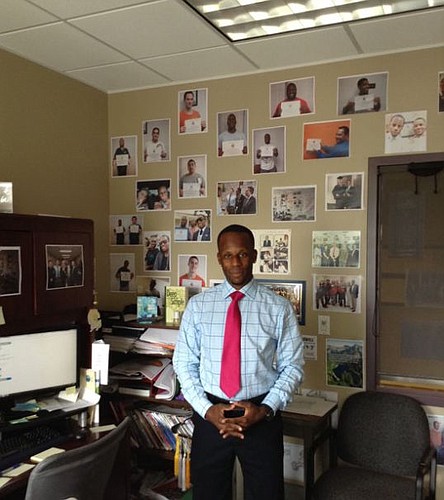
There are two ways to get into the Richard A. McKissick Memorial Developing Adults with Necessary Skills program: Be incarcerated at the pre-trial detention facility and fill out an application, or be sentenced by a judge to participate.
Since its founding in 1998, DAWN has helped more than 150 male and female inmates earn a GED or high school diploma while also learning the basic skills needed to succeed in life after they completed their sentences and were released.
Funded by an assistance grant from the U.S. Department of Justice — about $400,000 this year — the program was started as a nonprofit by Richard McKissick to help inmates transition back into the community. It later became a city-operated initiative. The program was named in McKissick’s memory after he died in January.
“The program challenges participants to take control of their lives, re-enter the community and the workforce, and contribute,” said Damian Cook, city grants administrator.
“Mr. McKissick wasn’t about giving away second chances. He wanted you to work for it. The inmates know it’s not a pushover program. That’s the reputation we want,” he added.
The classroom in the jail is very basic. There’s no internet access or computers, so students study with textbooks. Items like staplers and even paperclips are prohibited.
“It’s a nontraditional environment with nontraditional students. Every day is different, because these students have a different desire for education. For many of the students, it’s their last chance,” said Terry Powell, city re-entry coordinator and instructor for the men’s classes.
Last year, 91 inmates were enrolled in DAWN and 16 graduated. So far this year, 19 of 37 participants have graduated.
In addition, only four of the 35 graduates have returned to jail, Powell said.
According to the U.S. Department of Justice, DAWN graduates have a recidivism rate of less than 10 percent, compared to more than 23 percent for the comparable inmate population.
A former middle school teacher who joined the DAWN program in 2013, Powell teaches two two-hour classes five days a week in the jail.
He said most of his students are 30 to 40 years old. The youngest student he’s had in a class was 19, the oldest was 54.
Shelletta Baker, a former high school and college mathematics teacher, began teaching the women’s class in August 2015.
She starts each class by reciting an affirmation with her students:
“Today, I’m excited to participate in the enhancement of my development, while earning the benefit of an education. I am intelligent, I am focused, and I am capable. Today, and every day, I am eager to learn.”
Baker calls it “motivation” and said the students expect it and look forward to it.
“If I forget, the students will tell me we didn’t have motivation. Some of my students really thrive on it,” she said. “They want to be here. They want to get out of the cycle.”
Most of Baker’s students complete the program in three to six months. When they graduate from DAWN and finish their jail sentences, she gives them some advice as they prepare to rejoin society.
“When it’s time for them to go, I tell them ‘I don’t want to see you again — not in here.’” Baker said.
Powell has in his office what he calls the “Wall of Success.” It’s a collection of photos of students who graduated from DAWN. Some have continued their educations.
He said one of his most memorable students was 26 years old when he applied for DAWN. When he was tested for the program, he read at the fourth-grade level and his math skills were third-grade level, but he was motivated.
“I couldn’t stop him from wanting to get his diploma. He asked for extra homework and when he passed his first exam, it gave him the belief that he could get his diploma,” Powell said.
He said that student is enrolled in St. Johns River State College.
Another of his former students is studying logistics at Florida State College at Jacksonville and another is completing his application to Middle Tennessee State University, Powell said.
“For many students, DAWN is the first time they’ve succeeded in their life. This is their way out,” he said.
For students who want to enter the workforce rather than continue to higher education, DAWN works with StaffTime, an HR consulting and job placement firm.
That part of the process begins while the students still are attending classes.
“We go to the jail and talk to the inmates. We help them prepare resumes and do mock job interviews. It’s like show-and-tell but with the meats and gravy,” said StaffTime CEO Rose Conry.
She said her company starts working with the students about six months before they are scheduled to graduate and then rejoin the community after incarceration.
Conry said she also works with employers to help them understand what DAWN is about and how the program can make an ex-offender a better candidate for employment.
“When we explain the program, most employers are more receptive to considering a DAWN graduate — and we explain that the person needs a second chance,” she said.
There’s also a reality check for the program participants.
“We tell the inmates they’re going to have to be better than other employees. They have to show up every day, show up on time, have a great attitude and work safely,” said Conry, who views the program as a way to help people who have proved they will work for a second chance.
“The more people we can help take a different path — that will make our community stronger and better,” she said.
(904) 356-2466